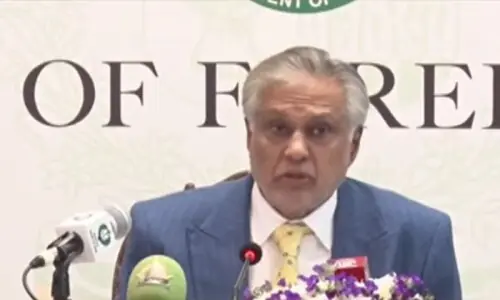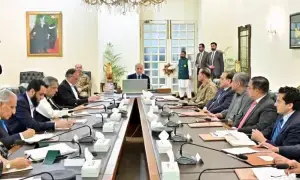ISLAMABAD: The Pakistan Tehreek-i-Insaf (PTI) government has decided not to privatise, instead revive, 195 ‘sick’ state enterprises and ordered bureaucrats to deliver on its policies within six months to secure their three-year term in office.
In a federal cabinet meeting chaired by Prime Minister Imran Khan on Thursday, two separate policies were approved — one to deal with 195 sick entities and the other to rein in the bureaucracy to ensure that top officials follow government policies.
The meeting decided that the prime minister would unveil the 100-day achievements of the government before the nation on Nov 29.
Speaking to media at the conclusion of the meeting, Information Minister Fawad Chaudhry said under the strategy to deal with sick government units, the cabinet approved formation of Sarmaya-i-Pakistan Company (SPC) which would decide how to revive sick entities. “The SPC will be formed on the basis of Singaporean and Malaysian models,” he added.
Top bureaucrats’ stay at a post for three years linked to performance
“Prime Minister Imran Khan will be the head of board of governors (BoG) of the company which will decide the fate of sick entities, including the Pakistan International Airlines (PIA), Pakistan Steel Mills and Pakistan Railways,” the minister said.
“These 195 government entities are facing several problems and running into losses and, therefore, we cannot privatise them,” he said, adding that three federal ministers and seven experts from the private sectors would be part of the BoG of the SPC.
Mr Chaudhry said the government wanted to rid the sick entities of its influence.
Bureaucracy
“We do not want to make bureaucrats loyal to us in six months, but they have to follow our policies,” the information minister said.
He said the cabinet had devised a policy for “securing” three-year term of top government officials in their office.
However, under the policy the bureaucrats will have to undergo an “interim” period of six months, during which their performance will be evaluated and then it will be decided whether they should be given two-and-a-half years extension or not.
Asked whether the government wanted to seek loyalty of the bureaucracy under this policy, the minister said: “Yes, we want the bureaucracy to toe our line and polices. We have been elected by the people to make our own policies which should be followed and implemented by the bureaucracy.”
He said a committee headed by Prime Minister’s Adviser Shahzad Arbab had been set up to look into the matters of tenure of federal secretaries and other top government officials and present recommendations to the prime minister who would decide their fate.
Other members of the committee are: Defence Minister Pervez Khattak, Railways Minister Sheikh Rashid, PM’s Adviser Dr Ishrat Hussain and Minister for Planning and Development Khusro Bakhtiyar.
Danish children
Mr Chaudhry said the government wanted to fully adhere to the decisions of other countries’ courts and, therefore, the cabinet decided to send back two Denmark national children — Hira Tahir and Dua Tahir — to their country as a Danish court had given a decision in favour of their father but their mother Afsheen Baksh had taken them to Pakistan.
“The prime minister ordered an inquiry into the incident which will be conducted by a magistrate,” the information minister added.
He said the prime minister was also concerned about Pakistani prisoners languishing in different countries and the cabinet decided that they would be extended legal assistance so that they could return to the motherland.
Mr Chaudhry said the government was also determined to bring Dr Aafia Siddiqui, a Pakistani woman convicted of terrorism in the US, back to Pakistan.
The cabinet also decided to evolve a centralised purchase system for procurement of computers and other equipment required for establishing e-government system. Earlier, it was decided that federal ministries will make their separate purchases but the cabinet decided that all purchases will be done under a single head.
The cabinet also approved appointment of Ilyas Khan as managing director of the Pakistan Tourism Development Corporation and the commissioners of Security Exchange Commission of Pakistan.
Dues of media houses
The information minister said the cabinet approved release of Rs230 million to retire outstanding dues of the media houses.
He, however, said the media houses should not depend on government funding in future and redo their revenue generating strategies to run their businesses.
While receiving the dues, he said, owners of media houses should not forget those low-salaried journalists who had not been receiving their pays regularly.
Published in Dawn, November 16th, 2018
































